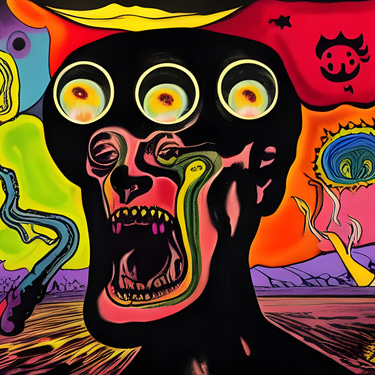Duke Jizzerstein
Duke Jizzerstein first appeared on the New York jazz scene in 1953 as a piano player for The Corky Delgado Quartet. He initially split duties with Hank Blatt but took over the role completely in early 1954, just in time for Delgado’s famous Celebrity Club residency that resulted in the legendary album “A Night at the Celebrity Club”. Jizzerstein spent most of 1954 touring the United States with Delgado’s quartet and in early 1955 made his first trip to Europe with the band. His unorthodox playing style was an immediate sensation overseas and led directly to the quartet returning to France and Germany in the last half of 1955. In early 1956 Jizzerstein amicably split from Delgado and formed his own trio with bassist Pork Dackney and drummer Frankie Zub.
Jizzerstein spent most of 1956 playing clubs in the New York area, refining his trio’s sound, and in February 1957 he reunited with Corky Delgado to record his first album “The Jizztastic Sounds of Duke Jizzerstein”. The sessions for the album were produced by Walter Fleckman, famous for his work with trumpet player Henry Lutz and pianist Hector Vardugo. The album was recorded in five days and released in April 1957. Largely ignored in North America, it was a hit in Europe with significant sales in France, Belgium, and Portugal. Jizzerstein spent most of the summer and autumn of 1957 touring in Europe, and thus began a routine that Jizzerstein would follow for the next several years of spending late autumn and winters working out new material in small clubs in New York City, recording albums in the winter or spring, and then embarking on extensive tours of Europe each summer.
By 1959 Jizzerstein’s use of heroin and other opiates had become more pronounced and although he would continue to tour and produce records, his addiction would sometimes intrude on his work. Famously, at the end of “Code of the Jizz” on “Who’s Got the Jizz?” one can hear Jizzerstein’s head hit the piano keyboard as he passed out while playing. In another notorious incident, during the making of "We're Jizzin' Tonite" Henry Blatt had been brought into the sessions to back Jizzerstein. During the recording of "Jesus Floyd" Blatt committed suicide in the studio’s control booth by inserting the barrel of a gun into his mouth and pulling the trigger. The faint sound of the gunshot can be heard near the end of the song. When asked why he used that take for the album Jizzerstein simply said, "It was the best one".
By 1960 Jizzerstein had fully developed his style of playing, which he called “Mad Jazz”. Although often confused with “Free Jazz”, Jizzerstein differentiated between the two by saying “Mad Jazz is everything Free Jazz was intended to be... the main difference being it isn’t beholden to the predilections of bourgeois social fascists”. Jizzerstein estranged himself from much of the North American jazz community by penning articles for underground jazz magazines in which he was highly critical of his peers and what he saw as their willingness to appeal to “suburban sensibilities” and “prevailing fashions”. He would attend shows with the sole intention of heckling the performers and was banned from several clubs in Manhattan, (although these bans were often restricted to his attendance at these clubs as a patron. He was still booked into many of them to play).
In 1965, after kicking his heroin habit, Jizzerstein moved permanently to Europe. Dackney and Zub went with him and soon after arriving the trio evolved into a quartet with the addition of multi-instrumentalist Zeus Laughlin. Jizzerstein made his base of operations in West Berlin and established an aggressive touring schedule for the rest of the 1960s. The quartet first played behind the Iron Curtain in 1967 and it was from this time period that the ambiguous ties that Jizzerstein had with various communist governments in Europe developed. Within a year or two it was as if the Cold War didn’t exist for Jizzerstein and those associated with him. He could seemingly travel freely between Warsaw Pact and NATO countries without so much as a cursory search. He toured Eastern Europe extensively for the next five years, where all of his records were easily obtainable, and where he was often lauded by high ranking public officials as the exception to decadent Western culture.
In 1968 Jizzerstein was approached by Lothar Klunt of the German music collective Gehennatron and presented with the opportunity to form his own recording company, fully financed by Klunt. Jizzerstein recruited music industry veteran Jurgen von Falkenhayn and together they founded Music Recording Productions Industrial Industries.
In 1973 Jizzerstein began to use heroin again and as a result his musical output suffered. In the years that followed he released no albums and scaled back his live appearances dramatically. In early 1977 he entered a recovery program in Switzerland and in September of that year resumed touring. He would release his first album in almost five years in March of 1978. The new album, “I Gotta Jizz” would be hailed universally as a return to form.
Throughout the 1980s and 90s Jizzerstein would continue to record prolifically and tour at a punishing rate. Many of his most famous albums were produced during this period including, “The Genius of Jizz“, “Make Way for the Jizz Wizz”, and “Catch the Jizz!”. In 1985 he would purchase the rights to all of his early recordings and re-release them through MRPII.
At the beginning of the new millennium Jizzerstein started to scale back his public activities as years of substance abuse and constant touring caught up with him. His last performance was in the spring of 2007 at the 606 Club in London, and his last album “All the News That’s Fit to Jizz” was released in 2010. Today Jizzerstein lives in Berlin where he oversees the operations of MRPII.
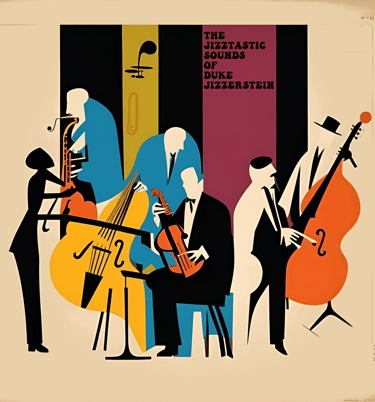

The Jizztastic Sounds Of Duke Jizzerstein
April 1957
Duke Jizzerstein's debut album. Produced by Corky Delgado and Walter Fleckman. Recorded in February 1957
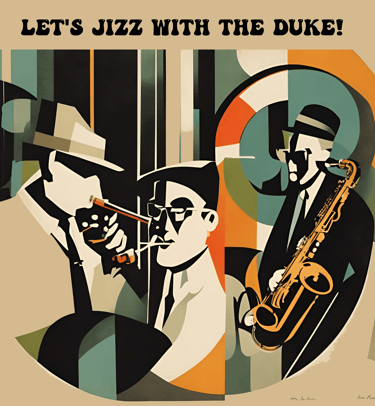

Let's Jizz With The Duke
December 1957
Duke Jizzerstein's second album. Produced by Corky Delgado and Walter Fleckman. Recorded in August 1957
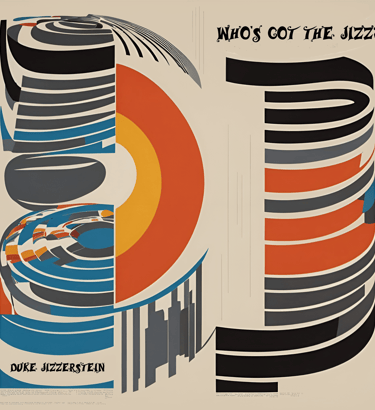

Who's Got The Jizz?
May 1958
Duke Jizzerstein's third album. Produced by Corky Delgado and Walter Fleckman. Recorded in December 1957
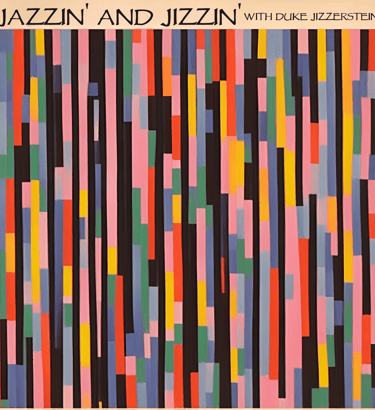

Jazzin' And Jizzin'
January 1959
Duke Jizzerstein's fourth album. Produced by Corky Delgado and Duke Jizzerstein. Recorded in August 1958
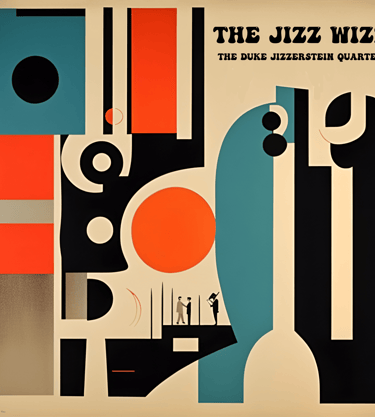

The Jizz Wizz
September 1959
Duke Jizzerstein's fifth album. Produced by Corky Delgado and Duke Jizzerstein. Recorded in April 1959
